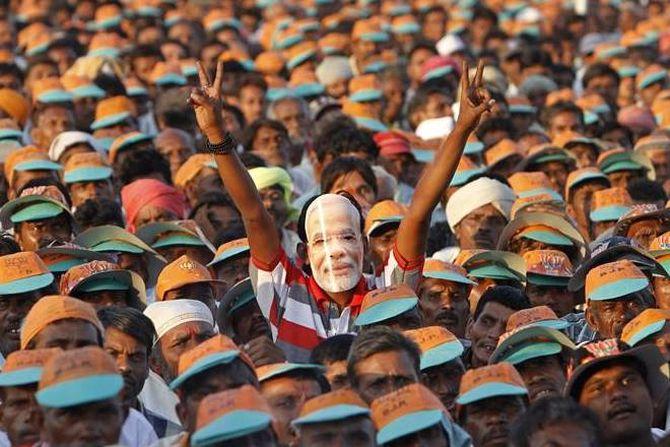Between now and the general elections (likely in May 2019) there are 12 assembly polls, which analysts say, in a way will also be interpreted as a referendum on the Modi-led government's key reforms

With the Election Commission (EC) calling elections in Gujarat, analysts believe political considerations are likely to play a more dominant role in driving economic decisions.
Markets at current levels, though are pricing in a BJP victory to some extent, they are likely to trade sideways till the final outcome is known.
Between now and the general elections (likely in May 2019) there are 12 assembly polls, which analysts say, in a way will also be interpreted as a referendum on the Modi-led government's two key reforms - the note ban drive and Goods and Services Tax (GST) implementation.
Of the states, the focus will be on Gujarat (Dec 2017), Karnataka (April 2018), Madhya Pradesh (MP) (Dec 2018) and Rajasthan (Dec 2018).
Reports also suggest that the EC could hold elections for states that are scheduled to hold assembly elections between end-2018 and mid-2019 simultaneous with the centre 2019 general election.
"Once the results of this election are out, the anticipation for the outcome of 2019 Lok Sabha election would be quite near.
Secondly, Gujarat being the home state of the PM Modi, his popularity in the home state would be taken as a significant sample for his popularity at all-India level," says G Chokkalingam, founder & managing director, Equinomics Research.
Over the past month, the government has announced a slew of policy measures that include interest-free agriculture loan, formation of new Gujarat Industrial Development Corporation (GIDC) units, etc.
Two major policies - a recapitalisation package of Rs 2.11-lakh crore for public sector banks and the infra push via the Bharatmala Project - caught market's attention.
"Big-ticket reforms are behind us and we expect incremental reforms to focus on execution of already announced measures - the banking sector, strategic stake sales, infrastructure spending and privatisation.
We also expect the government to pause on fiscal consolidation in FY18.
We do not expect the government to throw caution to the wind, but we do expect some shades of populism to emerge over the next year," says Sonal Varma, managing director and chief India economist at Nomura.
So, how will the markets interpret the outcome and what should your investing strategy be?
Though most analysts expect Narendra Modi-led Bharatiya Janata Party (BJP) to emerge victorious in Gujarat, a loss, they say, could impact the market sentiment, as the political stability and the present government's thrust on the economic reforms are the basis for anticipation of long-term bull-run in the markets.
Thus far in calendar year 2017 (CY17), the S&P BSE Sensex and the Nifty50 indices have rallied around 24 per cent and 26 per cent, respectively.
The mid-and small-caps indices on the BSE have outrun their large-cap peers with a gain of nearly 35 per cent and 42 per cent, respectively during this period.
"I think the rally will now take a breather till the election outcome is known. Gujarat outcome will be taken as a sample of Modi's popularity at the all-India level.
A victory is essential to give confidence to the markets. I don't think the foreign institutional investors will also be too keen to invest in India till clarity emerges. Given the recent rally, investors can book profits partially," Chokkalingam advises.
Mutual funds that have invested nearly Rs 95,000 crore into the equity segment, though, are likely to continue pouring in money.
This in turn, will keep the downside protected in case of any adverse domestic or global event, say analysts.
"Markets are discounting a Modi / BJP win in Gujarat. Domestic institutions have been investing at a time when there have been FII outflows.
Unless there is a significant negative that compels investors to take a hard look at India, flows - both domestic and foreign will continue to keep markets buoyant," says Tirthankar Patnaik, India Strategist at Mizuho Bank.
Photograph: Reuters











